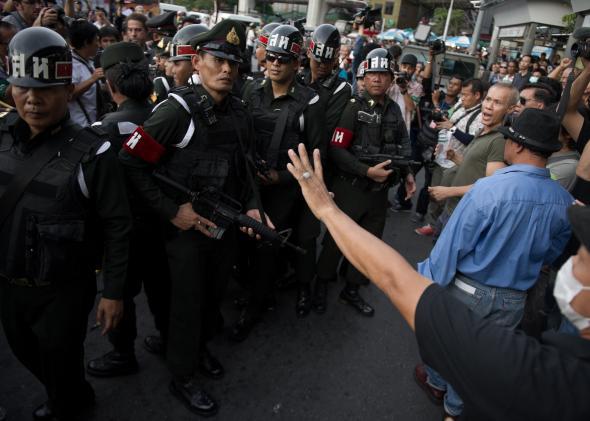The Netizen Report originally appears each week on Global Voices Advocacy. Ellery Biddle, Lisa Ferguson, Weiping Li, Hae-in Lim, Sarah Myers, and Bojan Perkov contributed to this report.
Global Voices Advocacy’s Netizen Report offers an international snapshot of challenges, victories, and emerging trends in Internet rights around the world. This week’s report begins in Thailand, where the army, now in the second week of its “coup without a coup,” has ordered Internet service providers to “monitor and stop any information dissemination that could breed disorder within the Kingdom or would negatively impact the stability of the state and the morale of the people.” In meetings with Thailand’s largest newspapers and 108 ISPs, the military generals requested their “cooperation” in culling unfavorable coverage of the coup from the Internet.
Since imposing martial law on May 20, the Thai army has blocked more than 100 websites and shut down or taken over numerous television and radio stations. Military officials have detained at least two prominent political journalists, one of whom was summoned to the Army Conference Center in a public television broadcast. Journalists and activists are rallying behind calls from the Southeast Asia Press Alliance for an end to military censorship and the release of detained journalists.
Political scientist and Global Voices author Aim Sinpeng writes that in Thailand’s “Information War,” the fear of “propaganda to elicit violence by ill-intent individuals” is driving military censorship and media intimidation. She continues: “The military believes there are ‘underground’ groups in Thailand determined to wreak havoc on the country. They worry that unless they control and centralize the dissemination of information, they will not win this battle.”
Free Expression: Floods in Serbia bring wave of anti-censorship activism
In the wake of catastrophic flooding over the past several weeks, panicked Serbian citizens who criticized government-led relief efforts online are now facing a new problem: censorship. The Serbian government, which has a history of using repressive measures against media, has taken to detaining individuals for “inciting panic during a state of emergency.” Bloggers wrote a joint post [link in Serbian] criticizing the censorship, which has been reposted widely.
Thuggery: Singaporean blogger apologizes for investigative reporting
Singaporean political blogger and activist Roy Ngerng is being prosecuted by his own government for what they claim to be defamatory content on his blog, the Heart Truths. In a series of articles, Ngerng accused Prime Minister Lee Hsien Loong of embezzling money from a government pension fund. Last week, the blogger apologized to the PM, “acknowledg[ing] that this allegation is false and completely without foundation” in an apology post, which features a photo of unironically apologetic-looking roses and invites the prime minister to engage with him an “open dialogue.” His plea for leniency regarding damages and legal fees was rejected. In a 14-minute video addressed to the public, Ngerng said that he doesn’t regret anything, but added that he was at a loss as to how to respond.
Privacy prevails in German “revenge porn” case
Breaking up just got a little bit easier to do in Germany, where a court ruled that intimate photos should be deleted at the end of a relationship if one of the partners calls for it. According to the Guardian, “consent to use and own privately recorded nude pictures, the court stated, could in this instance be withdrawn on the grounds of personal rights, which are valued higher than the ownership rights of the photographer.”
A leaked NSA memo revealed that the agency is able to work around Skype’s cryptographic protections in order to surveil communications, making the service a “vital” part of its surveillance regimen.
Industry: Russian bear eats Twitter bird?
As the Electronic Frontier Foundation’s Eva Galperin put it, Twitter “stepped down from the Free Speech Party” last week when it began geoblocking @PravyjSektorRus, an account run by Ukrainian nationalist political party Pravy Sektor (“Right Sector”), in response to a Russian court order. The deputy head of Russian telecommunications regulator Roskomnadzor threatened several days earlier to ban Twitter entirely if it did not agree to delete tweets that violated Russian law. “There are two ways Twitter’s actions are disappointing,” Galperin writes:
First, Twitter has no employees or assets in Russia, so it should not have to comply with a Russian court order at all. And the order isn’t even about a Russian account—it’s a Ukranian one. Worse yet, Pravy Sektor’s account is plainly political. If Twitter won’t stand up for political speech in a country where independent media is increasingly under attack, what will it stand for?
Twitter also blocked tweets for the first time in Pakistan in response to a request from an employee from the Pakistan Telecommunications Authority, who deemed them “blasphemous” and “unethical” in Pakistan. Twitter’s Country Withheld Content page notes that the company will withhold access to certain content in a particular country when it receives a “valid and properly scoped request from an authorized entity.”
Internet Insecurity: Anonymous Philippines vs. China
Geopolitical unrest in the South China Sea spilled over onto the Internet as Anonymous Philippines denounced China for “oppressive poaching” by hacking 200 some Chinese government websites.
